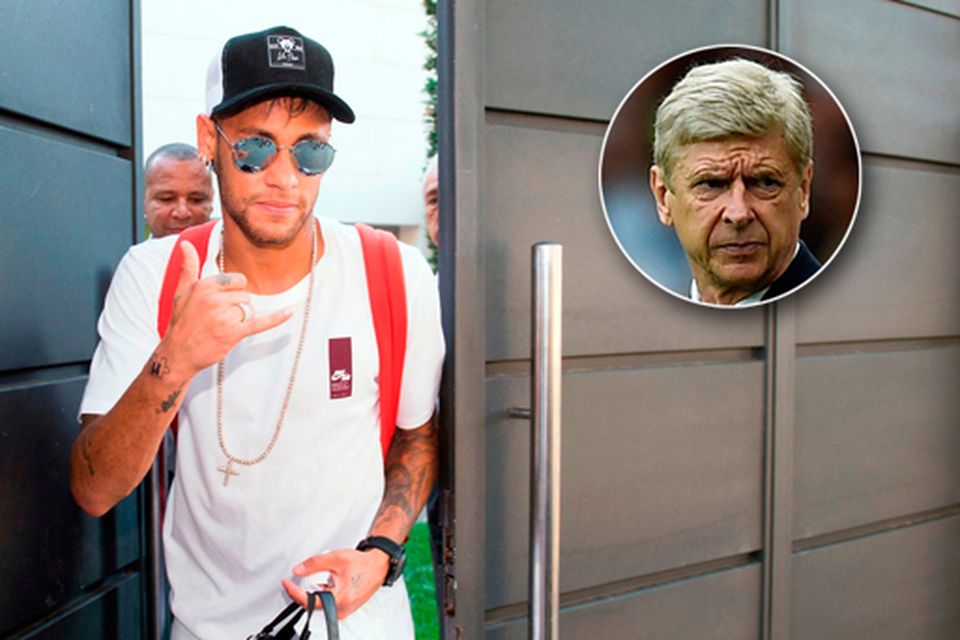'Once a country owns a club, anything is possible' - Arsene Wenger says Neymar doesn't 'justify the investment'
Arsene Wenger believes that Paris Saint Germain have spent £200m on Neymar to promote Qatar, and that his record transfer fee is “beyond calculation and beyond rationality”.
The Arsenal manager said that the Neymar deal, which is due to be completed this week, would distort the market because it would not be subject to normal profit and loss considerations. Rather, the fact that PSG are owned by Qatar means that Neymar has been bought for Qatari national pride.
For Wenger, PSG’s ownership gives them different motivations, and of course different resources, from everyone else. Which is why they can double the existing world record fee set by Manchester United for Paul Pogba, a more conventional transfer by a more conventional club. Wenger said that PSG “cannot justify” the spending on Neymar, but he knows that they do not need to. They are playing a different game.
“For me, it is the consequence of the ownerships that have completely changed the whole landscape of football in the last 15 years,” Wenger said of the record deal. “Once a country owns a club, everything is possible.”
PSG are nominally subject to Financial Fair Play, but Wenger knows that Qatari money and pride will get this deal over the line. “It becomes very difficult to respect financial fair play,” Wenger said, “because there are different ways for a country to have such a big player to represent a country.”
Because Qatar is driving the deal for Neymar, for the sake of national prestige, they are not so concerned about a return on their investment. “The number today involves a lot of passion, pride and public interest, and you cannot rationalise that anymore,” Wenger said. “You cannot justify the investment, it looks unusual for the game. That’s why I always [support] football living with its own resources. Apart from that, we are not in a period anymore where you think ‘If I invest that, I will get that back’. We are beyond that.”
The consequence of the rules of the transfer market changing this way is that fees are inflated even more than normal. Wenger pointed to how United paid £89m (€105m) for Pogba just last summer and one year on, those numbers are going to be more than doubled.
“It also looks like the inflation is accelerating,” he said. “We crossed the £100m line last year and only one year later, we’re crossing the £200m line. When you think that Trevor Francis was the first £1m player [in 1979] and that looked unreasonable, that shows you how much distance and how far we have come. How big football has become. It’s beyond calculation and beyond rationality.”
As transfer fees spiral, it becomes harder to judge what ‘market value’ for a player is. Wenger said that it all hinges on the resources of the buying club. In this case, PSG’s resources have allowed them to pay Neymar’s full release clause.
“Today a player is worth what the club can afford to spend,” Wenger said. “The price of a player depends on the identity of the buyer. You cannot put it in the context of the market. It is the financial potential of the buyer that decides the price of the player today.”
This means that when Barcelona pocket the £200m transfer fee, all their negotiations for replacements will become far harder, because clubs know how rich they are. “When Barcelona will want to buy a player, the clubs will say, ‘my friends, you have €220m in your pocket’. What costs £15m today will cost £100m for them.”
It is a sign of how skewed the market is now, and why the biggest fees simply cannot be judged by normal standards. “You don’t look at the numbers in their absolute value anymore,” Wenger sighed. “Football has been for a long time out of normal society and the numbers are like the NBA in basketball. It is not comparable to normal life anymore. Those are the numbers. It was already out of context of society. After, it just becomes a bit extra. You cannot calculate what it brings in anymore. It is just a number.”














